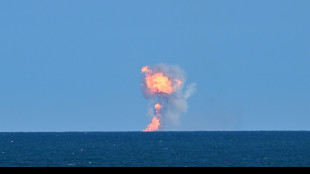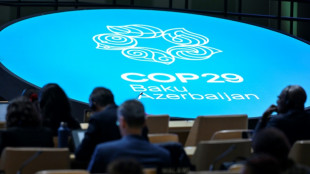
-
 ICC to sentence Timbuktu war criminal
ICC to sentence Timbuktu war criminal
-
Ugandan opposition figure Besigye 'kidnapped', says wife

-
 Australia's Jason Day eyes more major glory after resurgence
Australia's Jason Day eyes more major glory after resurgence
-
Machu Picchu security boosted after visitors spread human ashes

-
 Popovic hails Australia character in 'crazy' World Cup qualifier
Popovic hails Australia character in 'crazy' World Cup qualifier
-
Taliban govt clearing 'un-Islamic' books from Afghanistan shelves

-
 Argentina beat Peru as Uruguay hold Brazil
Argentina beat Peru as Uruguay hold Brazil
-
Asian markets struggle as traders weigh geopolitical tensions

-
 Tatum stars as Celtics end Cavaliers unbeaten start
Tatum stars as Celtics end Cavaliers unbeaten start
-
Hurting India under pressure in blockbuster five-Test Australia series

-
 'They killed her dream': Israel strike leaves woman footballer in coma
'They killed her dream': Israel strike leaves woman footballer in coma
-
Iraq holds its first census in nearly 40 years

-
 Iraqis face tough homecoming a decade after IS rampage
Iraqis face tough homecoming a decade after IS rampage
-
Russian net tightens around last civilians left in eastern Ukraine

-
 Olympic champion Tebogo aims to inspire next generation of African athletes
Olympic champion Tebogo aims to inspire next generation of African athletes
-
Valencia on target as ten-man Ecuador upset Colombia

-
 'Rust' to premiere three years after on-set shooting
'Rust' to premiere three years after on-set shooting
-
Strike at French cognac maker Hennessy over measures in China spat

-
 Xi, Lula meet in Brasilia to 'enhance ties'
Xi, Lula meet in Brasilia to 'enhance ties'
-
SpaceX fails to repeat Starship booster catch, as Trump watches on

-
 'I have left a legacy': Nadal retires from tennis
'I have left a legacy': Nadal retires from tennis
-
US recognizes Venezuela opposition's Gonzalez Urrutia as 'president-elect'

-
 European powers, US seek to censure Iran at UN nuclear watchdog board
European powers, US seek to censure Iran at UN nuclear watchdog board
-
UNAIDS chief says husband, Ugandan opposition figure Besigye, 'kidnapped'

-
 Nadal's sensational career ends as Netherlands defeat Spain in Davis Cup
Nadal's sensational career ends as Netherlands defeat Spain in Davis Cup
-
US announces talks with Israel over civilian casualties in Gaza

-
 SpaceX fails to repeat Starship booster catch, as Trump looks on
SpaceX fails to repeat Starship booster catch, as Trump looks on
-
G20 summit ends with Ukraine blame game

-
 Trump appoints TV celebrity 'Dr. Oz' to key US health post
Trump appoints TV celebrity 'Dr. Oz' to key US health post
-
European stocks fall on Ukraine-Russia fears, US focused on earnings

-
 Last-gasp Szoboszlai penalty rescues Hungary draw with Germany
Last-gasp Szoboszlai penalty rescues Hungary draw with Germany
-
Germany, Netherlands draw as Nations League group stage ends

-
 Hong Kong tycoon Jimmy Lai takes witness stand in collusion trial
Hong Kong tycoon Jimmy Lai takes witness stand in collusion trial
-
Guardiola set to extend stay as Man City boss - reports

-
 Minnows Botswana hold Egypt to qualify with Mozambique, Tanzania
Minnows Botswana hold Egypt to qualify with Mozambique, Tanzania
-
Inter Miami coach Martino leaving club for 'personal reasons' - club source

-
 Chinese man sentenced to 20 months for Falun Gong harassment in US
Chinese man sentenced to 20 months for Falun Gong harassment in US
-
Hong Kong court jails 45 democracy campaigners, drawing condemnation

-
 'I did it for Rafa': Alcaraz after keeping Spain Davis Cup dream alive
'I did it for Rafa': Alcaraz after keeping Spain Davis Cup dream alive
-
Alcaraz keeps Spain and Nadal Davis Cup dream alive

-
 Trump names China hawk Howard Lutnick commerce secretary
Trump names China hawk Howard Lutnick commerce secretary
-
Europe's pivotal role in bid to strike COP29 climate deal

-
 MotoGP champion Martin falls on Aprilia debut
MotoGP champion Martin falls on Aprilia debut
-
Bodies burned after Haiti police, civilians kill 28 alleged gang members

-
 'Probably my last match': Nadal after Davis Cup singles defeat
'Probably my last match': Nadal after Davis Cup singles defeat
-
Iran faces new censure over lack of cooperation at UN nuclear meeting

-
 Afghan woman teacher, jailed Tajik lawyer share top rights prize
Afghan woman teacher, jailed Tajik lawyer share top rights prize
-
Pressure mounts on Scholz over bid for second term

-
 Take two: Biden makes it into G20 leaders' photo
Take two: Biden makes it into G20 leaders' photo
-
Russia vows response after Ukraine fires long-range US missiles


Fifty killed in train station strike as civilians flee east Ukraine
A rocket attack on a train station in the eastern Ukrainian city of Kramatorsk killed dozens on Friday as civilians raced to flee the Donbas region bracing for a feared Russian offensive.
Fifty people were killed, including five children, the regional governor of Donetsk, Pavlo Kyrylenko, said as the toll rose on one of the deadliest strikes of the six-week-old war.
President Volodymyr Zelensky reported 300 were injured, saying the strike showed "evil with no limits".
AFP journalists saw the bodies of at least 30 people grouped and lying under plastic sheets next to the station, before being loaded onto a military truck.
Blood was pooling on the ground and packed bags were strewn outside the building where the remains of a large rocket was lying with the words "for our children" in Russian.
"I'm looking for my husband. He was here. I can't reach him," a woman told AFP, sobbing and holding her phone to her ear.
Another woman in a state of shock said: "I was in the station. I heard like a double explosion. I rushed to the wall for protection.
"Then I saw people covered in blood entering the station and bodies everywhere on the ground."
Body parts, broken glass and abandoned baggage lay scattered around the station and across the platform.
Russia's defence ministry said suggestions it had carried out the attack were "absolutely untrue".
The bombing came as European Commission President Ursula von der Leyen and EU foreign policy chief Josep Borrell were in Kyiv to show solidarity with Ukraine.
More than a month into President Vladimir Putin's invasion of Ukraine, Moscow has shifted its focus to eastern and southern Ukraine after stiff resistance torpedoed plans to swiftly capture the capital Kyiv.
Instead, Russian troops appear set on creating a long-sought land link between occupied Crimea and the Moscow-backed separatist statelets of Donetsk and Lugansk in Donbas.
Heavy shelling has already begun to lay waste to towns in the region, and officials have begged civilians to flee, while the intensity of fighting is impeding evacuations.
But officials continued to press civilians to leave.
"There is no secret -- the battle for Donbas will be decisive. What we have already experienced -- all this horror -- it can multiply," warned Lugansk regional governor Sergiy Gaiday.
"Leave! The next few days are the last chances. Buses will be waiting for you in the morning," he added.
- 'More horrific' -
Meanwhile, near the capital Kyiv, residents and Ukrainian officials returning after a Russian withdrawal from the area were trying to piece together the scale of the devastation.
Violence in the town of Bucha, where authorities say hundreds were killed -- including some found with their hands bound -- has become a byword for allegations of brutality inflicted under Russian occupation.
But Zelensky warned worse was being uncovered.
"They have started sorting through the ruins in Borodianka," northwest of Kyiv, he said in his nightly address.
"It's much more horrific there. There are even more victims of Russian occupiers."
Violence in the area has caused massive destruction, levelling and damaging many buildings, and bodies are only now being retrieved.
Ukraine's Prosecutor General Iryna Venediktova said on Thursday that 26 bodies had been recovered from two destroyed apartment buildings so far.
"Only the civilian population was targeted. There is no military site here," she said, describing evidence of war crimes "at every turn".
Fresh allegations emerged from other areas too, with villagers in Obukhovychi, northwest of Kyiv, telling AFP they were used as human shields.
- 'Help us now' -
Moscow has denied targeting civilians but growing evidence of atrocities has galvanised Ukraine's allies to pile on more pressure.
On Thursday, the EU approved an embargo on Russian coal and the closure of its ports to Russian vessels as part of a "very substantial" new round of sanctions that also includes an export ban and new measures against Russian banks.
In addition, it backed a proposal to boost its funding of arms supplies to Ukraine by 500 million euros ($544 million), taking it to a total of 1.5 billion euros.
So far, the bloc had frozen 30 billion euros in assets from blacklisted Russian and Belarusian individuals and companies under sanctions, it said Friday.
In a show of support, the EU's von der Leyen and Borrell were in Kyiv Friday for talks with Zelensky and to visit the scene of civilian deaths in Bucha.
En route to Kyiv, Borrell told journalists the EU would supply 7.5 million euros to train Ukrainian prosecutors to investigate war crimes, which Russia is accused of committing in the country.
The Group of Seven industrialised nations also agreed to more sanctions, including a ban on new investments in key sectors and fresh export restrictions, as well as the phasing out of Russian coal.
At the United Nations, 93 of the General Assembly's 193 members voted on Thursday to suspend Russia from the body's human rights council over its actions in Ukraine.
Russia blasted the move as "illegal and politically motivated", while US President Joe Biden said it confirmed Moscow as an "international pariah".
"Russia's lies are no match for the undeniable evidence of what is happening in Ukraine," Biden said, calling Russia's actions in the country "an outrage to our common humanity".
Ukraine has welcomed new measures on Moscow, as well as the UN suspension, but it continues to push for more support.
Zelensky called for a "cocktail" of sanctions in an address to the Finnish parliament, scolding "those who are making us wait, wait for the things that we need badly, wait for the means of protecting our lives".
The president's appeal echoed a call from his foreign minister, Dmytro Kuleba, who earlier asked NATO for heavy weaponry, including air defence systems, artillery, armoured vehicles and jets.
"Either you help us now -- and I'm speaking about days, not weeks -- or your help will come too late and many people will die, many civilians will lose their homes, many villages will be destroyed," Kuleba said after meeting NATO foreign ministers in Brussels.
burs-sah-sea/jbr/kjm
W.Moreno--AT
